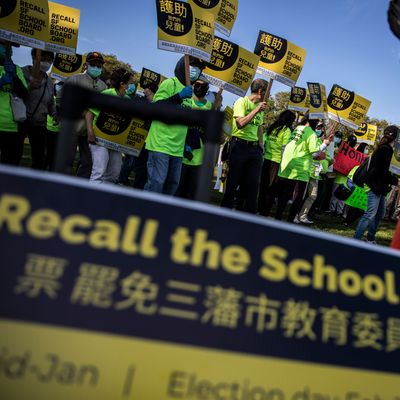
In a West Coast edition of the national turmoil over education, San Francisco voters on Tuesday overwhelmingly supported a recall initiative aimed at three outspokenly progressive members of the city’s school board. The trio were the only members of the board who had served long enough to be recalled, so the vote was a decisive repudiation of the current leadership. It’s a good example of how once-obscure school boards became centers of attention during the COVID-19 pandemic as parents, students, and teachers struggled with mandated distance learning and other health precautions.
The recalled board members — board of education president Gabriela López as well as commissioners Alison Collins and Faauuga Moliga — angered both liberal and conservative parents by keeping most public schools in San Francisco closed from March 2020 to August 2021 even as nearby districts and private schools reopened. During that time, the board attempted to rename 44 schools to get rid of “injustice-linked” names such as Abraham Lincoln, George Washington, Paul Revere, and current U.S. senator (and former San Francisco mayor) Dianne Feinstein. While the board eventually rescinded that action, it angered Asian American voters by eliminating merit-based admissions to the city’s elite Lowell High School (a step overturned by the courts) and offended the LGBTQ+ community by refusing a spot on the Parent Advisory Council to a gay dad because he was white.
The recall election drew modest turnout (26 percent of San Francisco voters), but the results were too emphatic to be second-guessed; the pro-recall vote amounted to 79 percent against Collins (who attracted particularly intense criticism for suing her colleagues after her removal from the position of board vice-president, costing the city significant legal fees), 75 percent against López, and 72 percent against Moliga. Mayor London Breed, who supported the recall, will appoint successors within ten days.
While the recall and the events that led up to it will be conflated by conservative media nationally with a “parents rights” backlash against “woke” political leadership and pandemic-driven school closures, the circumstances were largely local. Like Breed and State Senator Scott Wiener (who represents the city in Sacramento), much of the city’s Democratic establishment backed the removal of the school-board members, though there was some shadowy outside money fueling the recall drive that may have been more ideologically driven. A big question now is whether the successful school-board action will spill over into a June recall election aimed at progressive San Francisco district attorney Chesa Boudin, who is drawing fire for allegedly paying insufficient attention to an ongoing surge in property crimes in the city.
Of course, there’s no risk of San Francisco shifting significantly to the right; just last September, the city gave 87 percent of its vote to Democratic Governor Gavin Newsom’s successful fight against a recall initiative aimed at him. But clearly the traumatic events of the past couple of years have forced a reconsideration of what one of America’s great bastions of progressive politics thinks of itself.






























